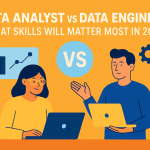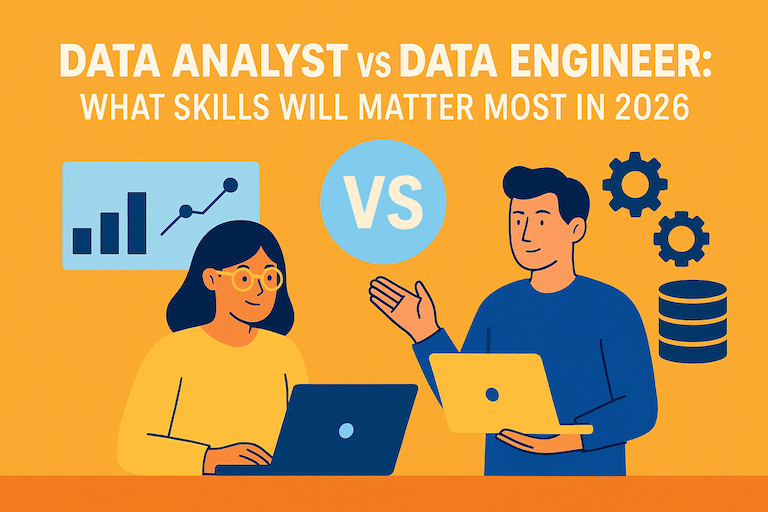
The Top 10 Skills You Need in Your Data Team in 2026
Data is much easier to come by today, and business leaders rely on it for insights and reporting, but also for forecasting and modelling. This means that, if you are a senior leader or you’re managing a data team, you need to have the right structure, talent, and skill sets to deliver on these new expectations and influence business outcomes.
To find out what employers really value, we reviewed over 2,000 open data roles across the UK and the USA in October 2025. Read this blog to recognise the skills gap you might have on your team and the opportunities for improvement to help your business increase its competitive edge and improve overall performance.
Comparison: UK vs USA data skills
While the UK and USA share many of the same requirements for technical skills, the focus of each market reflects different levels of digital maturity and investment. The USA market seems to be at a slightly more advanced stage of data transformation, with automation and machine learning becoming standard across many teams. The UK market, while still evolving, places a stronger emphasis on reporting, visualisation and the ability to translate data into practical insight.
Similarities between UK and US data roles
Across both countries, certain skills remain universal for data professionals. SQL, Python and cloud platform knowledge are standard requirements for both analysts and engineers. Data visualisation skills using tools such as Tableau or Power BI also feature prominently, as businesses in both markets need employees who can leverage new technology to communicate actionable insights clearly.
Key differences between UK and US data roles
- Cloud maturity: while UK organisations are still transitioning to the cloud, many US companies have fully adopted cloud-native infrastructures. US job ads more frequently mention hands-on experience with services like AWS Glue, BigQuery or Azure Data Factory.
- Automation and AI integration: machine learning and AI-related tasks appear more often in US job descriptions, particularly within engineering roles. The UK market tends to view these as specialist or emerging areas rather than standard expectations.
- Excel dependence: UK employers still value advanced Excel skills for day-to-day analysis, while US teams rely more on programming and automated tools.
- Real-time analytics: US organisations prioritise real-time data processing to support faster decisions, whereas many UK roles still focus on batch-based reporting.
- Communication and business context: both markets value analysts who can link data to business strategy, but this expectation is more explicitly stated in UK roles, often under “business acumen” or “stakeholder communication.”
What are the top 10 skills that data teams need in the UK?
The demand for skilled data professionals in the UK continues to grow despite an overall softening in the job market. This is because businesses are investing more heavily in analytics, automation and AI. While technical ability remains essential, employers are now looking for people who can combine technical skill with business understanding and communication.
Based on our analysis of open data roles across the UK, these are the skills most commonly requested for Data Analysts and Data Engineers in 2025:
Technical foundations
- SQL: still the core skill for working with data. Employers expect analysts and engineers to write queries efficiently and understand relational database structures.
- Python: used for automation, data transformation and analysis. Teams value candidates who can write clear, maintainable scripts rather than rely on manual processes.
- Cloud platforms (AWS, Azure, GCP): most data infrastructure is now hosted in the cloud. Experience with at least one major cloud computing platform is often listed as essential.
- ETL and pipelines: knowledge of building and maintaining data pipelines is key for engineers. Understanding how to move, clean and structure data supports accurate reporting.
- Data warehousing and modelling: many roles require experience in designing schemas that support efficient querying and scalable reporting.
Analytical and visual skills
- Data visualisation (Tableau, Power BI): tools that help translate complex information into clear visuals are in strong demand. Analysts who can design intuitive dashboards stand out.
- Excel: still widely used for ad-hoc analysis and reporting. Advanced functions, pivot tables and lookups remain standard expectations.
- Machine learning fundamentals: basic knowledge of algorithms and predictive modelling is increasingly common in job descriptions, even for analyst roles.
Broader capabilities
- Big data tools (Spark, Hadoop): as data volumes grow, teams need experience with distributed computing frameworks.
- Communication and business acumen: employers want analysts who can explain findings clearly and align insights with business goals.
What are the top 10 skills that data teams need in the USA?
There’s an increasing demand for data professionals in the United States, driven by the growth of AI, automation and cloud-native solutions. US job descriptions place greater emphasis on advanced engineering and automation. Analysts and engineers are expected to have hands-on experience with real-time data processing, machine learning and cloud-based architecture.
Technical foundations
- SQL: remains a vital skill for querying and managing databases. Candidates who can write efficient, well-structured queries are highly valued.
- Python: continues to dominate data analytics and engineering roles. It is used for automation, model development and data pipeline management.
- Cloud platforms (AWS, Azure, GCP): experience with cloud ecosystems is essential. US employers often expect a strong understanding of cloud-native services, such as AWS Lambda or BigQuery.
- ETL and pipelines: building scalable and automated data pipelines is a key part of both analyst and engineer roles. Proficiency with tools such as Airflow or dbt is commonly requested.
- Data warehousing and modelling: knowledge of warehouse design and dimensional modelling supports efficient data storage and faster access for analytics teams.
Advanced analytics and automation
- Machine learning and AI: US data teams are increasingly expected to integrate predictive and prescriptive analytics into business intelligence. Familiarity with frameworks such as TensorFlow or PyTorch is often mentioned.
- Real-time data processing: organisations that rely on continuous monitoring or customer analytics look for experience with tools like Kafka or Flink.
- Big data tools (Spark, Hadoop): large-scale data handling remains a core requirement, particularly in enterprise environments.
Broader capabilities
- Data visualisation (Tableau, Power BI, Looker): data professionals are expected to communicate insights effectively through well-designed dashboards.
- Business and communication skills: as data takes a larger role in strategy, professionals must explain insights clearly and connect them to business priorities.
Key takeaways: Building a future-ready data team
- AI and automation are reshaping data operations: repetitive data tasks such as cleansing and transformation are now handled by AI tools, freeing analysts to focus on insight and strategy.
- SQL and Python remain core skills: despite the rise of AI tools, employers still expect a strong command of traditional data languages for querying, scripting and pipeline management.
- Cloud and data engineering experience are essential: the demand for expertise in AWS, Azure, GCP, Snowflake and Databricks continues to rise as organisations migrate to scalable, cloud-native systems.
- Machine learning knowledge is becoming standard: both analysts and engineers are expected to understand predictive modelling, even at a basic level, to support AI-driven analytics.
- Data visualisation and storytelling skills drive impact: software tools like Tableau, Power BI and Looker are critical for turning analysis into actionable business insight.
- Soft skills make a difference: leadership communication, stakeholder management and business understanding help data teams connect insights to strategic goals.
- Continuous learning is non-negotiable: upskilling in automation, AI, governance and ethics ensures professionals stay relevant in a fast-moving environment.
- Regional focus differs: US employers prioritise automation, machine learning and real-time analytics, while UK employers still emphasise reporting, Excel and business acumen.
- Collaboration between analysts and engineers is key: aligned teams that share pipelines, models and insights deliver faster, more reliable results.
- Future-ready data teams balance technology with adaptability: combining technical strength with curiosity and communication will define success in 2026.
Suggested resources
- Online learning: Coursera, DataCamp and AWS Training offer courses tailored to analytics, engineering and cloud skills.
- Job market insights: LinkedIn and Indeed provide real-time views of which skills employers are requesting most often.
- Industry research: Reports from Lightcast, The Royal Society and the UK Parliament POST series offer deeper insight into long-term skills demand.
If your organisation is reviewing how your data team is structured or planning its next stage of growth, Albatrosa can help. We work with data leaders to identify skill gaps, design effective analytics functions and deploy the right mix of tools and people to meet your goals.
Henry Stehr
Your blog is a constant source of inspiration for me. Your passion for your subject matter is palpable, and it’s clear that you pour your heart and soul into every post. Keep up the incredible work!
Comments are closed.





















1 comment